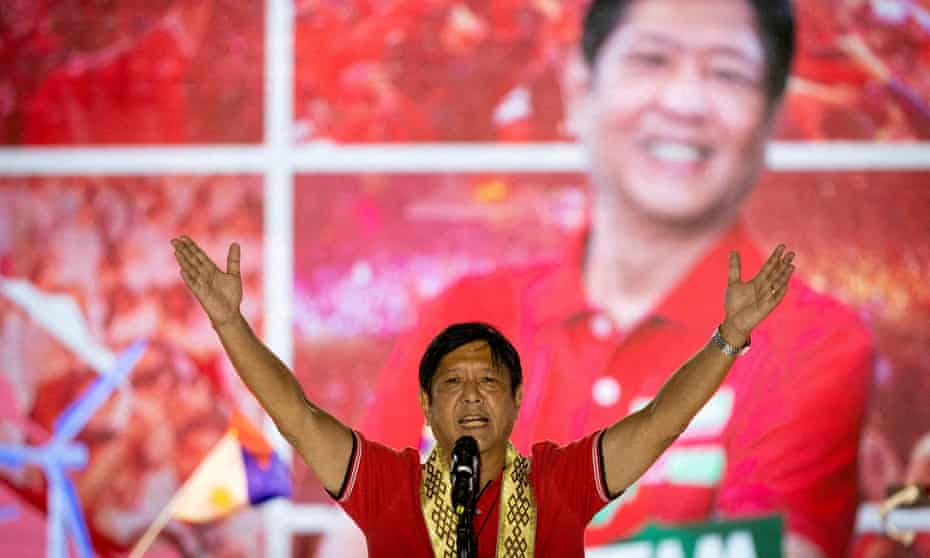Editorial
The late dictator’s son didn’t have to rig the polls as his father did. But his electoral victory is still bad news for democracy

Ferdinand ‘Bongbong’ Marcos Jr at a campaign rally prior to his election as the new president of the Philippines.
Photograph: Eloisa Lopez/Reuters
Tue 17 May 2022
Thirty-six years after the people of the Philippines swept the Marcos family from power in a peaceful popular uprising, they have returned it to the presidency via the ballot box. Last week’s electoral landslide for Ferdinand “Bongbong” Marcos Jr, son of the late dictator, was a shocking and frightening moment for those who survived the violence of his father’s regime and witnessed the plunder of as much as $10bn from the country. The incoming president claimed more than double the votes of his closest opponent, Leni Robredo, a human rights lawyer and the incumbent vice-president.
Disinformation (extensive, heavily organised and lucrative for those behind it) has played a crucial role. Across social media, the true history of Ferdinand Marcos Sr’s rule – of torture, executions, debt and economic crisis – has been erased by the lie of a “golden age” of stability and prosperity. At the same time, its members were “celebritised”, with TikTok videos presenting them as an aspirational, influencer-style figures while Mr Marcos Jr sidestepped major debates and tough interviews. Simultaneously came relentless and often misogynistic attacks on Ms Robredo
It is not just that the population is highly technologically literate but often less media literate. There are deeper issues. The People Power revolution of 1986 was unfinished. The political elites remained in place; influential families hold up to 90% of elected positions. Most of the money amassed by Mr Marcos Sr was never recovered, and schools failed to teach the new generations the full story of his rule. The political advance was not matched by social and economic progress; the political dynasties and big conglomerates have ensured that the Philippines remains one of the most unequal societies in Asia.
The outgoing president, Rodrigo Duterte, has also contributed. His brutal and erratic authoritarianism – notably a “war on drugs” which has killed thousands, including children – proved popular. He has strengthened the police and army, creating a culture of impunity, while undermining democratic institutions including independent media. He allowed the late dictator to be buried in a cemetery for war heroes, helping to rehabilitate his image. Critically, his daughter Sara Duterte decided not to stand for president, running (successfully) as Mr Marcos Jr’s vice-president.
The Philippines must contend with the aftermath of the pandemic: almost a quarter of the nation now live below the poverty line. The country is balancing uneasily between the US and China, with repercussions for the wider region. Mr Marcos Jr has nothing to offer, though some insist that he will not be as ruthless as his father. He has already painted himself as a victim of the press.
Other countries should also take heed. As one leading expert on disinformation notes, this success reflects problems seen in many advanced democracies, not just in the global south; Facebook’s public policy director for global elections previously described the Philippines as “patient zero”. Reiterating the truth is not enough. Reaching out to excluded communities and crafting compelling narratives is essential. Ms Robredo’s campaign created real passion at the grassroots, but the efforts came too late. The Marcos family’s return to the top is a triumph of determination and has been a long time in the making. In that respect alone, their opponents – and progressives elsewhere – could learn something from them.
No comments:
Post a Comment